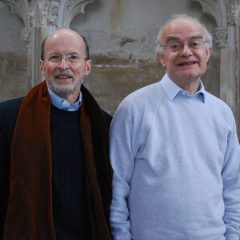Choral legend lands in Minnesota with music composed especially for VocalEssence
By Terry Blain Special to the Star Tribune APRIL 19, 2018 — 11:49AM
http://www.startribune.com/choral-legend-lands-in-minnesota-with-music-composed-especially-for-vocalessence/480270893/

Englishman John Rutter is a phenomenon in the world of choral music, celebrated worldwide for the easy melodiousness of his music — and the joy it brings to those who sing it.
His Minnesota connections date back more than three decades, to a day in 1983 when he received a mysterious parcel with a St. Paul postmark. The package contained a vinyl LP of Rutter’s Christmas carols, recorded by the Plymouth Festival Chorus, the Minneapolis choral ensemble that eventually became VocalEssence.
Sent by founding conductor Philip Brunelle, the gift sparked a long and fruitful relationship between Rutter and VocalEssence. The group’s various choirs have given well over 100 performances of Rutter’s music in the past 35 seasons.
Now 72, Rutter returns to the Twin Cities this week for a concert celebrating VocalEssence’s fast-approaching 50th anniversary season. The composer brings with him a new work called “Music,” written especially for the Minneapolis group. Rutter will conduct the piece Saturday for a VocalEssence concert at the Cathedral of St. Paul, with the program also featuring three more Rutter compositions.
Speaking by phone from his home in England last week, Rutter mused about his Twin Cities connections and this week’s VocalEssence concert.
Q: You’ve said you no longer accept commissions to write new pieces. Why did you make an exception for VocalEssence?
A: Philip Brunelle and I go back a long way, and I’ve always been struck by how professional and imaginative his programming with Vocal Essence is. It’s a model for anyone who’s running that kind of musical organization. So when he said he’d like me to write a small piece for this concert, “yes” just had to be the answer.
Q: In addition to the new work, you’re also conducting some traditional spirituals. What attracted you to make arrangements of these pieces?
A: It’s interesting, because I think spirituals went through a period of being slightly looked down on by the black community in America, because they projected what was thought of as an old-fashioned “Uncle Tom” image. But I think we’ve worked through that now, and realized these songs are part of the heritage of the music of America, and we should celebrate and rejoice in them. So I’m very much looking forward to doing them.
Q: You conducted VocalEssence once before, in 2002. What are your memories of that visit?
A: I got a sense of a finely honed choir that had the technical skills to give choral performances to the very discerning audiences you have in the Twin Cities. I have a clear memory of the smaller choir, the VocalEssence Ensemble Singers, in particular. They were just very refined, very professional, and at the same time projected a sense of enjoyment.
Q: Do you prefer conducting your own works, or listening to someone else conduct them?
A: That’s like saying would you rather be a driver in a fast car than a passenger. And the answer is, it depends who’s driving. If it’s a driver you’ve got confidence in, then you can sit back in the passenger seat and it won’t be a white-knuckle ride.
But, of course, I enjoy conducting. For me, it’s fun, relaxation and therapy. And less stressful than composing.
Q: Your music is particularly popular in America. Why do you think that is?
A: I think it’s because there are fewer preconceptions in America about what contemporary music ought to be like. In Britain in the 1960s and ’70s it often felt like an aura of disapproval would hover ’round if ever you wrote a key signature or a tune. I don’t think that ever really loomed as large in America, where conductors, audiences and performers tended to say, “Well, do I like this or don’t I?”
Q: Are you saying American audiences are more open-minded to your music?
A: Yes. And the American can-do philosophy sort of set me free to be the kind of composer I am. As a private citizen I’m hugely interested in the avant-garde and cutting-edge, in finding new sound worlds. But very early on I discovered that if I have a gift for writing, that’s not the sort of writing I have a gift for.
Q: You’re also doing a community singing date with VocalEssence. What’s the appeal of an event like that?
A: It’s a no-pressure way of bringing people into choral music who may never have tried it, or perhaps dropped out, or just enjoy singing. It’s also a way of giving something back to the community. And it’s been scientifically proven that singing releases the same pleasure endorphins into the brain as chocolate!
Q: You’ve spent over half a century in the choral business. How has it changed?
A: The technical standard of choirs at the apex has raised itself hugely. But we need to watch that things don’t decay at the roots. People have so many more leisure choices now that it’s difficult to recruit amateurs for church choirs and choral societies. I think that some process of renewal has to take place.
Although there in Minnesota you have a state which takes music and singing in schools very seriously.
Terry Blain is a freelance classical music critic for the Star Tribune. Reach him at artsblain@gmail.com.